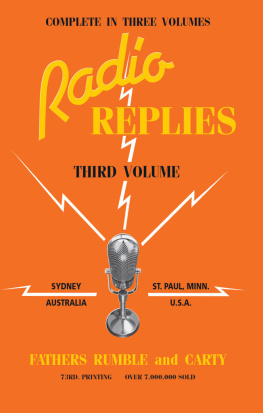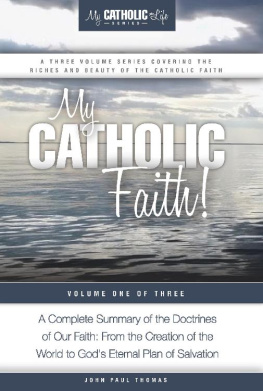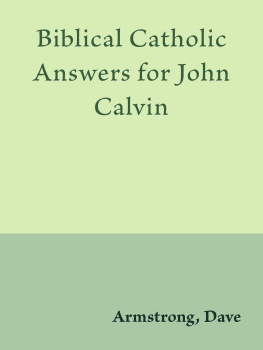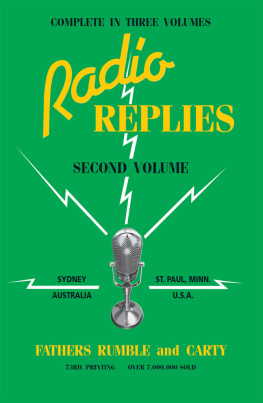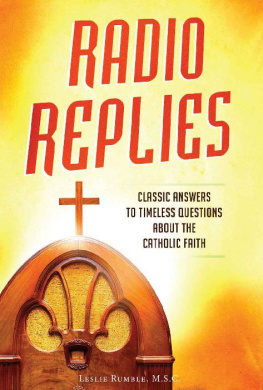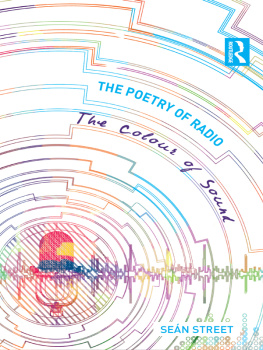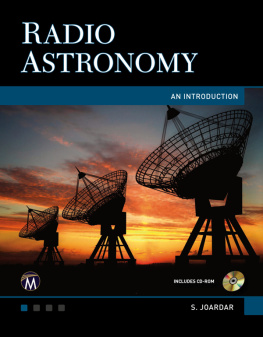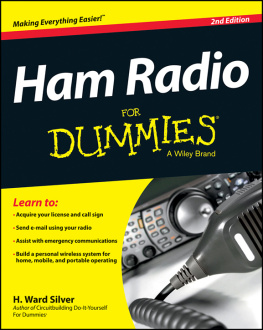F R. L ESLIE R UMBLE
Radio Replies
The Catholic Answers Edition

Radio Replies
The Catholic Answers Edition
2014 Catholic Answers
All rights reserved. Except for quotations, no part of this book may be reproduced or transmitted in any form or by any means, electronic or mechanical, including photocopying, recording, uploading to the Internet, or by any information storage and retrieval system, without written permission from the publisher.
Published by Catholic Answers, Inc.
2020 Gillespie Way
El Cajon, California 92020
1-888-291-8000 orders
619-387-0042 fax
catholic.com
Printed in the United States of America
ISBN 978-1-938983-69-6 (hardcover)
ISBN 978-1-938983-74-0 (paperback)
ISBN 978-1-938983-70-2 (Kindle, electronic)
ISBN 978-1-938983-71-9 (ePub, electronic)
Editors Note
The Catholic Answers edition of Radio Replies is an abridgement of three volumes by the same name, published beginning in 1938 through a collaboration between Australian radio apologist Fr. Leslie Rumblethe replies are in his voiceand his American counterpart Fr. Charles M. Carty. This editor has sought to shave the thousands of questions and replies in those volumes to a more manageable size: eliminating many instances of repetition, excising anachronisms (save a few that have been retained for their charm), and combining and consolidating where it seemed fitting.
To modern eyes, perhaps the most striking feature of the 836 replies given in this book is their faintly pugnacious tone. It seems inconsonant with our gentler age of ecumenism. But for much of the forty years that Fr. Rumble spent as the original and then foremost radio apologist, the English-speaking world was marked by a native and casual anti-Catholicism. That demanded a certain posture of response, and this posture is evident in the force, wit, and certitude found in each of the good priests defenses of the Church and its teachings.
Its true that many Catholics today feel beleaguered by moral relativism and general unbelief, but fortunately the presumption of enmity, the naked distrust, with which Catholics in England and her former colonies once had to contend daily, is for most of us an alien experience. But if things continue on their current path it may not always be thus. And so Im grateful to Fr. Rumble for his mettle; may it inspire us now and in the future.
Todd Aglialoro
Foreword
Discovering the multi-volume edition of Radio Replies years ago, as I was making my way back to the fullness of the Catholic Faith, was quite a jolt (the good kind). I had never encountered keen logic and precisely compressed argumentation before. Arcing like a laser beam through the fog of my Catholicism Lite, those books made hamburgers out my sacred cows and demolished the -isms I had imbibed, such as indifferentism, relativism, and dissentism.
The key to appreciating most fully this new Catholic Answers edition is to keep in mind that its original audience was not readers but listeners. These radio replies are a series of transcribed scripts drawn from the live showtitled Question Box Sessions of the original radio apologist, Fr. Leslie Rumble. The Australian priests format was simple, and, until he began in 1928, had never been done before on radio: answering challenging questions about the Faith mailed in from the public, much of which was anti-Catholic.
Modern readers cant help but wince now and again at the bluntness of some of the questions and replies. I know I did. Didnt our mothers tell us not to argue about religion and politics? Yet Rumble violates that advice with brio. The thing to be noticed, however, is he answers every questionno matter how sarcastically framed, no matter the emotions they are designed to inflamelike an honest and sincere inquiry. Even when hes clearly irritated by a rudely posed objection, he never replies with mere snark. The good priest wants to connect with the inquirer in the midst of disagreement.
One is tempted to indulge in some schadenfreude whenever Fr. Rumble takes apart, bolt by bolt, what the questioner must have thought was a convincing argument against the Faith. But, again, he knew the right what must be conveyed in the right way . Significantly, in this edition he uses the words love 186 times and truth 163 times. Not a bad communication ratio formula to keep in mind when speaking to someone outside the Church.
The sheer range of Fr. Rumbles knowledge is impressive. It has been said that the same basic objections to the Faith never go out of stylethey just keep getting recycled. And Radio Replies seems to cover them all, giving cogent answers to questions about everything from Gods existence to the the historicity of the Bible; from sexuality to socialism; from the papacy to miracles to Marian dogmas to the Inquisition; and more. Regardless of the subject, the answers take at face value the biblical warning that Gods people are destroyed due to lack of knowledge (Hos. 4:6). If souls really do hang in the balance, then answers to questions touching upon salvation that are not founded upon the truth are worse than worthless.
A Minnesota priest named Charles Mortimer Carty believed the same thing. Fr. Carty hosted his own radio show in Saint Paul, Minn., yet he felt that the printed word was needed to preserve and amplify its efforts. The word of God focuses often on the sense of hearing as the primary way we receive his self-disclosure in Christ. We learn that that faith comes by hearing in various ways (Mark 3:8; Luke 4:21, 8:10-15; Acts 19:5; Romans 10:17; Galatians 3:2). And so radio is uniquely suited to the work of evangelization. But its nature is fleeting; tracts, booklets, and books are needed to congeal, as it were, its contents.
Soon after Fr. Carty discovered his Australian counterpart, the two priests joined forceswith astounding results. In 1934, Fr. Carty published four short collections of Fr. Rumbles on-air questions and answers, selling seven million copies; out of the union of the spoken word and the written, a classic was born. Rumble & Carty did for Catholicism what Hope & Crosby did for comedy and Rogers & Hammerstein did for musicals.
One reason for his success, something of which the casual reader may not be aware, is that Fr. Rumble knew all about the inherent tension that comes with sharing the Faith with family members. Growing up Anglican in Sydney, young Leslie was exposed to many differing beliefs, including within his own family. His father, Harry Rumble, had converted to Catholicism in 1908 but then left the Church. His famous son eventually became a Catholic and was drawn to become a priestputting a ten-year strain on the relationship between father and son.
But Gods providence was at work. Most of his family also came back to the Faith, and not long after his ordination to the priesthood, Fr. Rumble gave them all Holy Communion. His radio apostolate continued until 1968, when glaucoma and other health problems forced his retirement. Fr. Rumble died in 1975 having spent his life making Christ and his Church better known and better loved.
* * *
Fr. Rumbles radio ministry arose during a renaissance of Catholic apologetics that emerged first out of England. Sterling figures such as Bl. John Henry Cardinal Newman, Fr. Ronald Knox, Fr. C.C. Martindale, Frank Sheed, Hilaire Belloc, G.K. Chesterton, and Arnold Lunn provided well-dressed ways to always be prepared to make a defense to any one who calls you to account for the hope that is in you (1 Pet. 3:15). In that era, Catholicism in the English-speaking world went from second-class religion to the thinking mans faith, a magnet for intellectuals.
Next page

